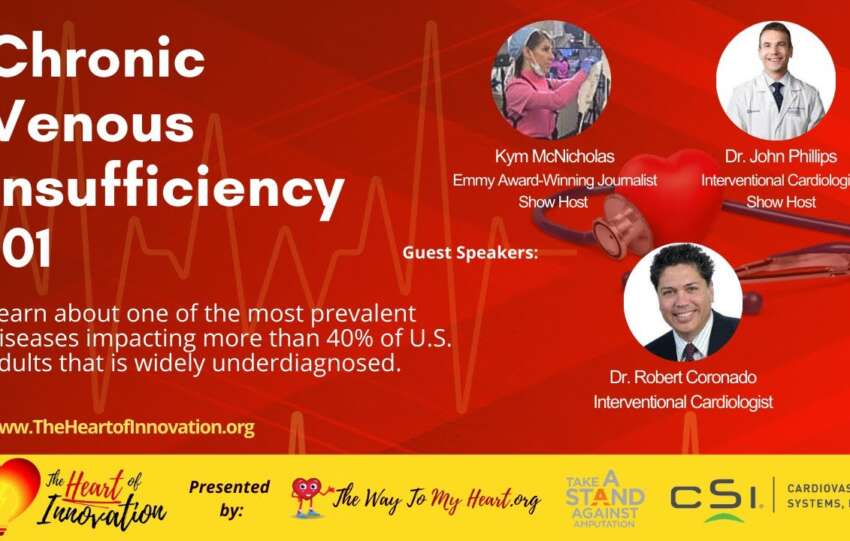Stop Giving Me The Brush-off

Stop Giving Me The Brush-off
This show started out with a conversation about Peripheral Artery Disease (P.A.D.) Awareness Month where show co-host Kym McNicholas shared her experience meeting and presenting alongside Congressman Henry Cuellar and Mission Vascular Interventional Cardiologist Dr. Pedro Mego about this circulation issue that is more prevalent and deadlier than all cancers combined except for lung cancer. It was part of The South Texas CLI (Critical Limb Ischemia, advanced stage of P.A.D.) and Limb Salvage Club’s (501c3) meeting of community leaders and media. During their discussion, they educated Cuellar’s constituents about a piece of legislation he’s pushing, which is the Amputation Reduction and Compassion Act. The ARC Act, if passed, would require Medicare and group insurance to cover initial testing for P.A.D. and that hospitals and surgeons perform a vascular assessment in order to get reimbursed for any amputation.
A Plight To Reduce Amputations
Kym says, “It was incredible to see this congressman so passionate about putting a stop to preventable amputations by encouraging an early diagnosis where frontline treatment is merely medicine and lifestyle modifications – and preventing surgeons from cutting off people's legs without attempting to restore bloodflow in blocked leg arteries.”
Interventional Cardiologist, Dr. Robert Coronado, who was filling in during this episode for Dr. John Phillips, affirmed the need for this legislation for the sake of the patients, with more than 51% of overall P.A.D.-related amputations being preventable if only patients were diagnosed sooner and physicians performed a vascular assessment prior to offering amputation.
One of the biggest risk factors for P.A.D. is diabetes and Kym adds that time is of the essence for action, with P.A.D. soon to become an epidemic as the American Diabetes Association now reports 1 in 2 U.S. Adults are either pre-diabetic or diabetic and 85% of all diabetic-related amputations as being preventable if only, as Dr. Coronado suggests, early diagnosis and proper vascular assessments in a timely manner.
Patients Getting The Brush-Off For Life and Limb-Threatening Issues
The discussion about Peripheral Artery Disease transitioned into a conversation about another vascular disorder that is prevalent and often overlooked and undertreated, which is venous vascular disease as a caller expressed concern about not getting a definitive diagnosis and treatment to bring her relief for what she explains as venous-related leg pain.
But the overriding message between this caller and another raises concern over patients feeling unheard and left to suffer without answers to what ails them.
In an article from 2017 published in the Harvard Business Review titled “Creating Time for Genuine Patient Listening,” the writers assert that the true healing potential of modern medicine relies on a resource that is currently being depleted: the time and capacity to genuinely listen to patients, understand their narratives, and grasp not only what ails them but also what truly matters to them. However, this approach seems to be more of an exception than a rule within today's healthcare system. Factors such as staffing deficits, mounting workloads accompanied by additional documentation requirements, and constant pressure from healthcare administrators demanding doctors do more with less are all hindering their ability to engage in meaningful conversations with patients.
This episode features Ashley and Douglas sharing their recent experiences during medical appointments. Due to these limitations within the healthcare system, both patients leave these encounters uncertain about whether they will live another day or if walking will remain possible for them. Dr. Coronado offers additional support and inspiration for Ashley and Douglas as they navigate through their health challenges.
37-Year-Old Patient Is Left Without Hope To Ever Walk Again
Ashley is a scientist with a PhD who was a former competitive athlete that now is in a wheelchair due to debilitating pain in her thighs when she stands up or begins to walk. Doctors acknowledge the potential for iliac vein compression in both legs but keep sending her away from consults without definitive answers and any hope for relief. Dr. Coronado validates Ashley's experience by explaining that venous vascular disease is not only the most prevalent vascular disorder worldwide but also frequently overlooked and misdiagnosed. He urges her to continue to get additional opinions until she finds the answers she deserves so she can get her life back.
Heart Surgeon Leaves Heart Patient Questioning His Mortality After Brush-Off
In another case, Douglas recounts his encounter with a heart surgeon whom he traveled over three hours to see regarding test results indicating that his heart was functioning at only 50% capacity and the presence of an arterial blood clot in his heart. However, during their scheduled 20-minute consultation, the surgeon abruptly left to take a phone call and returned, merely allowing five minutes with Douglas where he hastily prescribed additional heart medications and schedule another test for one month later. As for Douglas, he shares his experience with a heart surgeon whom he drove more than three hours to see to discuss test results that indicated his heart was only pumping at 50% of what it should and the presence of a blood clot somewhere in his arteries. Within moments of beginning the scheduled 20-minute consult, the surgeon left to answer a call and when he came back in the room, only devoted five minutes to ordering some additional heart medications and scheduling another test for a month later. He wouldn't spend additional time with Douglas listening to, addressing, and easing concerns about dizziness that resulted in a fall earlier that day, 48 episodes reported in another heart monitor test, as well as continued tachycardia and frequent activation of his defibrillator each day – all leaving Douglas with an impending sense of mortality. Dr. Coronado assured Douglas that shouldn't be the normalcy of a physician, especially one that is addressing life-threatening coronary issues. He also suggested a trip to the emergency room for critical bloodwork and additional timely imaging if symptoms continue.
The moral of this episode is the critical importance of relationship-centered communication as critical to saving life and limb.







